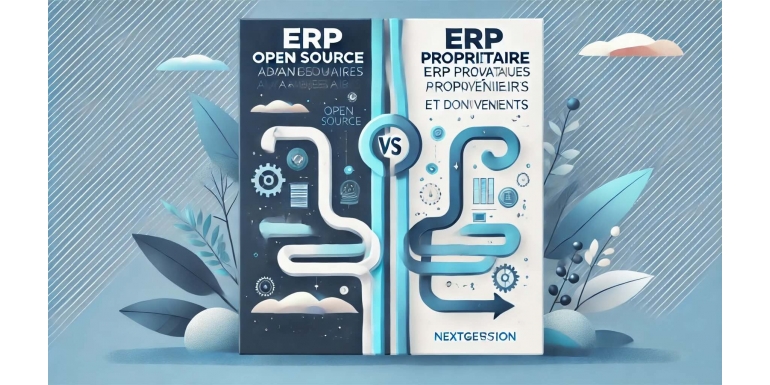
Open Source ERP vs. Proprietary ERP: Advantages and Disadvantages
When it comes to choosing an ERP (Enterprise Resource Planning) software for your business, one of the first decisions you'll need to make is whether to opt for an open source ERP solution or a proprietary ERP. Both options have their own set of advantages and disadvantages that must be carefully evaluated based on the specific needs of your company. In this article, we will examine the key differences between open source and proprietary ERPs, highlighting the pros and cons of each type of solution.
What is an Open Source ERP?
An open source ERP is a software whose source code is available to the public. This means that users can not only use the software but also modify, customize, and distribute it according to their needs. Open source ERPs are typically developed and maintained by communities of developers or by specialized companies that also offer support services.
Advantages of Open Source ERP
-
Flexibility and Customization: One of the biggest advantages of an open source ERP is the ability to customize the software to meet the specific needs of your business. You have full access to the source code, allowing you to modify or add features as required.
-
Lower Initial Costs: Open source ERPs are generally free or much cheaper than proprietary ERPs because you don't have to pay for licensing fees. This can represent significant savings, especially for small and medium-sized businesses.
-
Vendor Independence: With an open source ERP, you are not tied to a specific vendor. You have the freedom to choose your own development team or work with third-party providers for maintenance and updates.
-
Active Community: Open source ERPs often benefit from a large community of developers and users who contribute to the software's development, share solutions to common problems, and publish regular updates.
Disadvantages of Open Source ERP
-
Limited Technical Support: Unlike proprietary ERPs, where technical support is usually included in the licensing cost, open source ERPs often offer limited support. If you need technical assistance, you will typically have to purchase it separately or manage it internally.
-
Complex Implementation: Implementing an open source ERP can be complex and often requires advanced technical skills. Without a competent development team, customization and maintenance can become costly and time-consuming.
-
Security Risks: While access to the source code is an advantage, it can also pose a security risk if the software is not properly audited or regularly updated to fix vulnerabilities.
-
Scalability and Long-Term Support: Open source ERPs may sometimes lack the robustness and scalability needed to support large enterprises or rapidly growing organizations. Additionally, the longevity of long-term support often depends on the health of the community or the companies behind the project.
What is a Proprietary ERP?
A proprietary ERP is software whose source code is owned by a specific company. The use, modification, and distribution of the software are governed by strict licensing agreements. Proprietary ERPs are often offered as services, including updates, technical support, and sometimes even customization options.
Advantages of Proprietary ERP
-
Dedicated Technical Support: One of the biggest advantages of proprietary ERPs is the comprehensive technical support provided by the software vendor. This typically includes phone assistance, regular updates, and training services.
-
Stability and Reliability: Proprietary ERPs are often more stable and reliable as they are developed and maintained by dedicated professional teams. Updates and security patches are deployed centrally, ensuring a consistently improved product.
-
Ecosystem of Modules and Integrations: Proprietary ERP vendors often offer a wide range of modules and integrations that allow the software's functionality to be extended and adapted to various industries.
-
Scalability: Proprietary ERPs are designed to grow with your business. They can easily handle an increase in data volume, number of users, or complex processes, making them a solid choice for large enterprises.
Disadvantages of Proprietary ERP
-
Higher Costs: Proprietary ERPs are generally more expensive than open source solutions. Licensing fees, maintenance costs, and support fees can represent a significant investment, especially for small businesses.
-
Less Flexibility: Unlike open source ERPs, proprietary ERPs offer limited flexibility in terms of customization. Modifications often need to be made by the software vendor or certified partners, which can be costly and time-consuming.
-
Vendor Dependence: By choosing a proprietary ERP, you become dependent on the vendor for updates, security patches, and the software's evolution. If the vendor decides to change their pricing policy or discontinue support for a product, it could impact your business.
-
Lock-In Risks: Long-term commitment to a proprietary software vendor can lead to lock-in, where it becomes difficult and expensive to migrate to another solution if needed.
Conclusion: Which ERP to Choose?
The choice between an open source ERP and a proprietary ERP largely depends on the specific needs of your business, your budget, and your internal resources. If you are looking for a flexible and customizable solution with low initial costs, an open source ERP may be the right choice, provided you have the necessary technical skills to manage it. On the other hand, if you prioritize stability, dedicated technical support, and a ready-to-use solution with advanced features, a proprietary ERP might better meet your expectations.
Whichever option you choose, it's crucial to carefully evaluate your needs, involve all stakeholders in the selection process, and plan the implementation carefully to ensure the success of your ERP project.
